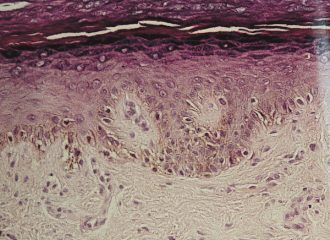Vesicant-Induced Skin Injury Research
 Sulfur mustard (bis-2-chloroethyl sulfide, SM) and nitrogen mustard (bis-2-chloroethyl ethylamine, NM), are vesicants that have been adapted for use as chemical weapons; they are potent blistering agents in the skin. The overall goal of this research project is to elucidate basic mechanisms of mustard damage to the skin with the objective of identifying new targets for therapeutic intervention and drug development.
Sulfur mustard (bis-2-chloroethyl sulfide, SM) and nitrogen mustard (bis-2-chloroethyl ethylamine, NM), are vesicants that have been adapted for use as chemical weapons; they are potent blistering agents in the skin. The overall goal of this research project is to elucidate basic mechanisms of mustard damage to the skin with the objective of identifying new targets for therapeutic intervention and drug development.
We discovered a highly novel link between skin injury and inflammation induced by vesciants and the endocannabinoid system, a ubiquitous signaling system that regulates cell growth and differentiation and down regulates inflammatory responses. Endocannabinoids consist of endogenous ligands (e.g., anandamide [AEA] and 2-arachidonoyl-glycerol, [2-AG]), cannabinoid receptors (e.g., the G-protein coupled CB1 and CB2 receptors), and metabolic enzymes that regulate endocannabinoid biosynthesis (e.g., N-acyltransferases, phospholipases) and degradation (e.g., fatty acid amide hydrolase [FAAH], monoacylglycerol lipase [MAGL]). Topical application of either SM or NM to mouse skin caused a marked and persistent upregulation of expression of the endocannabinoid degrading enzyme, FAAH, and receptor proteins that bind endocannabinoids including CB1, CB2 and peroxisome proliferator-activated receptor-? (PPAR?). Importantly, endocannabinoids have been shown to accumulate in human skin blister fluid, suggesting that they may be involved in the pathophysiologic response to vesicants.
We hypothesize that endocannabinoids regulate inflammation and wound healing in the skin following exposure to mustards and thus, the endocannabinoid system can be targeted for the development of countermeasures. Our key lead product entering advanced development is an inhibitor of FAAH. Our aims are to assess the role of the endocannabinoid system in vesicant-induced skin injury and wound healing and elucidate mechanisms by which mustards modulate keratinocyte expression of the endocannabinoid system. We will also evaluate a highly novel drug delivery system to improve efficacy of our lead compound.
Our studies provide key information on the role of endocannabinoids in the pathophysiology of vesicant-induced skin toxicity and lead to the development of more effective countermeasures.
Key Researchers:
Drs. Donald Gerecke and Jeffrey Laskin
